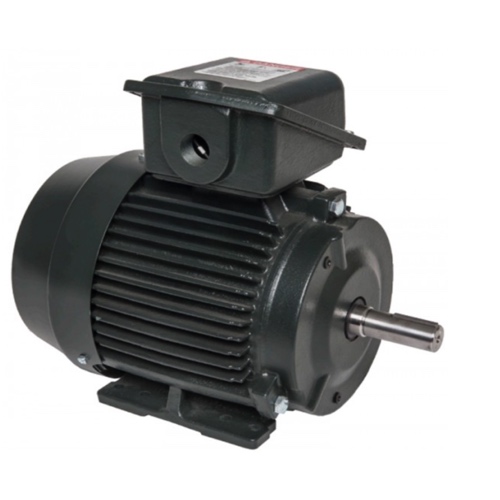Top Mount Motors

Electrical Motors are electromechanical devices that convert electrical energy to mechanical energy by producing a rotating force (torque) measured in revolutions per minute (RPM) and horsepower (HP). Medium size motors are designed and built to operate at 60 Hz with three phase voltage at 230 volts, 460 volts and 575 volts. These motors are used to drive compressors, pumps, fans, machine tools, conveyers and other processing and materials handling equipment in industrial sectors.
Toshiba Top Mount Motors are severe duty-rated, designed with a top-mounted conduit box for a reduced installation profile. The motors feature rugged construction, stronger bearings, cast iron strength, more torque, reduced vibrations, burnout resistance and covered housings to provide increased protection against weather, moisture and dirt. They are dust tight with a moderate seal against water and meet the requirements of the Energy Independence & Security Act of 2007 (EISA) and exceed the motor market needs.
Motor Starters, Soft Starters and VFDs
Motor Starters
Motor starters safely start and stop a motor in industrial applications. They are designed with a contactor, overload and circuit protection. They are used when basic motor control is required, where torque on the motor is not a concern and speed control is not needed. The advantages of motor starters include: lower cost, allows for remote operation, allows for monitoring of motor state (with the use of auxiliary contacts) and they are safe and efficient. The disadvantages include: high inrush current that can cause fuses to blow and breakers to trip if the inrush is too high, and the starter will allow a full torque to start the motor which can cause the motor to ramp up to full speed very quickly potentially causing the motor to wear and degrade prematurely.
Soft Starters
Soft starters protect motors from inrush current by gently ramping up the motor to full speed. They provide all of the same functions as a traditional motor starter. The advantages of soft starters include: they are less expensive than a VFD when only startup control is needed, they are a smaller system than a VFD where space is a concern and they prevent unwanted torque upon startup, prolonging the life of the motor. The disadvantages include: they are more expensive than a traditional motor starter and they do not allow for full speed control.
VFDs
A Variable Frequency Drive (VFD) allows for the slow ramp up of a motor during startup and the slowing down of the motor during shutdown. It also allows for full speed control during the entire run cycle of the motor. VFDs provide the same functions as both the traditional motor starters and soft starters. The advantages of VFDs include: full speed control (start, stop and in-between), more custom control and monitoring, energy savings due to efficient motor usage and less wear and tear on the motors. The disadvantages include: they are more expensive and larger than other motor control options and they generate heat that may require fans or AC units.

